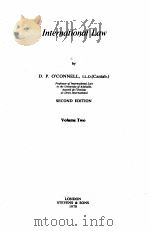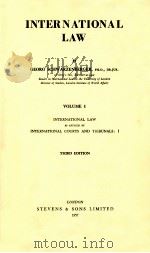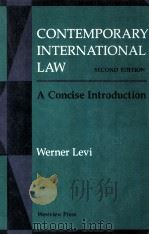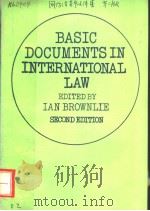《INTERNATIONAL LAW VOLUME TWO SECOND EDITION》
| 作者 | 编者 |
|---|---|
| 出版 | STEVENS & SONS |
| 参考页数 | 1345 |
| 出版时间 | 1970(求助前请核对) 目录预览 |
| ISBN号 | 无 — 求助条款 |
| PDF编号 | 812874908(仅供预览,未存储实际文件) |
| 求助格式 | 扫描PDF(若分多册发行,每次仅能受理1册) |

Part One GENERAL PRINCIPLES3
1.THE FORMATION OF INTERNATIONAL LAW3
2.THE RELATIONSHIP BETWEEN INTERNATIONAL LAW AND MUNICIPAL LAW38
3.PERSONALITY IN INTERNATIONAL LAW80
4.PROOF OF INTERNATIONAL FACT113
Part Two RECOGNITION127
5.THE THEORY AND MODES OF RECOGNITION127
6.RECOGNITION AND NON-RECOGNITION AND THE COURTS166
Part Three TREATIES195
7.THE MAKING OF TREATIES195
8.THE OPERATION OF TREATIES246
Part Four SOVEREIGNTY282
9.THE LEGAL CONCEPT OF THE STATE282
10.TITULAR, RESIDUAL AND DISTRIBUTED SOVEREIGNTY325
11.THECOMMONWEALTH, THE FRANCOPHONE SYSTEM AND THE NETHERLANDS REALM346
Part Five SUCCESSION365
12.STATE SUCCESSION365
13.SUCCESSION OF GOVERNMENTS394
14.SUCCESSION OF INTERNATIONAL ORGANISATIONS396
Part Six TERRITORY403
15.TERRITORY403
16.MARITIME TERRITORY454
17.AIRSPACE AND AIR LAW518
18.RIGHTS AND OBLIGATIONS IN RESPECT OF FOREIGN TERRITORY543
VOLUME TWO599
Part Seven JURISDICTION599
19.THE THEORY OF JURISDICTION599
The Concept of Jurisdiction599
The Jurisdiction to Prescribe and the Jurisdiction to Enforce602
20.MARITIME JURISDICTION604
Jurisdiction over National Vessels604
The Juridical Status of a Merchant Ship604
The Nationality of a Merchant Ship606
(a) Rules for nationality606
(b) States without sea coast607
(c) International organisations608
(d) Determination of the nationality of a ship608
The Law Governing Occurrences on Board on the High Seas608
(a) The law of the flag608
(b) The law of the flag of federal States610
The Law Governing Occurrences on Board in Foreign Waters610
(a) The law of the flag610
(b) The concurrent jurisdiction of the flag State and the local State611
20.MARITIME JURISDICTION——cont.612
Jurisdiction over Foreign Merchant Ships in Internal Waters612
The Territoriality Doctrine in Municipal Law Systems612
(a) English law612
(Ⅰ) Extension of English law to foreign ships in English ports612
(Ⅱ) Jurisdiction in rem over foreign ships in English ports614
(1) Suits of possession614
(2) Collision suits614
(3) Wages claims and salvage claims615
(Ⅲ) Jurisdiction generally under the Merchant Shipping Acts615
(b) The law of the United States616
(Ⅰ) Right of arrest on board617
(Ⅱ) Extension of criminal law on board617
(Ⅲ) Extension of civil law on board618
(Ⅳ) Civil actions of seamen relating to their service619
(Ⅴ) Application of the National Labor Relations Act to foreign ships622
(c) The law of France622
(d) Other nations with the French system624
(e) Other nations with the Anglo-American system625
The International Law Rules on Jurisdiction in Ports625
(a) The general practice in jurisdiction625
(Ⅰ) Detention on board a foreign ship626
(Ⅱ) Local laws relating to navigation, police, pilotage,customs, immigration, etc.627
(Ⅲ) Local laws concerned with the maintenance of public order627
(Ⅳ) Local civil law and jurisdiction627
(b) Involuntary entrance of vessels in distress627
(Ⅰ) Immunity of vessel from local jurisdiction627
(Ⅱ) Test of distress628
(Ⅲ) The extent of the immunity629
(c) Treaty Regime of Ports630
Jurisdiction over the Territorial Sea630
Innocent Passage in Customary International Law630
(a) Criminal and administrative jurisdiction over merchant ships in passage630
(b) Arrest of a ship in innocent passage632
(c) Civil jurisdiction over merchant ships in passage633
(Ⅰ) The status of a foreign ship in territorial waters for the purpose of the locus of a tort or contract633
(Ⅱ) The status of a foreign ship in territorial waters for the purpose of nationality by birth634
(Ⅲ) The status of a foreign ship in territorial waters for the purpose of collision jurisdiction634
(d) Jurisdiction over merchant ships not in innocent passage though in territorial waters635
20.MARITIME JURISDICTION——cont.636
Jurisdiction over the Territorial Sea——cont.636
Innocent Passage in Customary International Law——cont.636
(e) Jurisdiction over warships in innocent passage through the territorial sea636
Innocent Passage in the Geneva Convention on the Law of the Territorial Sea636
(a) Definitions636
(b) Criminal jurisdiction over ships in passage638
(c) Civil jurisdiction over ships in passage639
Jurisdiction over the Contiguous Zone639
Definition and Genesis of the Contiguous Zone639
The United States Tariff Act 1922642
The Legal Status of the Contiguous Zone643
Jurisdiction over Foreign Ships upon the High Seas645
The Freedom of the Seas645
(a) Freedom of navigation and freedom from arrest645
(b) Freedom of fishery and exploitation648
The Relativity of the Freedom of the Seas651
(a) Pollution of the sea652
(b) Nuclear damage and thermonuclear testing at sea653
(c) Broadcasting at sea654
Jurisdiction over Events occurring on Board Foreign Ships on the High Seas654
(a) Jurisdiction over criminal acts654
(b) Jurisdiction over sea traffic655
(c) Jurisdiction in salvage claims656
Circumstances in which Jurisdiction may be Exercised over Non-national Ships657
(a) Piracy657
(Ⅰ) The basis of piracy jurisdiction657
(Ⅱ) The definition of piracy659
(Ⅲ) Piracy under municipal law660
(Ⅳ) Violence by commissioned vessels661
(Ⅴ) Violence by unrecognised insurgents662
(b) The doctrine of hot pursuit663
(Ⅰ) The nature and rationalisation of hot pursuit663
(1) Common law affinity664
(2) Rationalisation of the rule664
(3) Genesis of the rule664
(Ⅱ) When the right arises665
(1) The catalogue of offences giving rise to hot pursuit665
(2) Where must the offence be committed?665
(Ⅲ) When the right terminates667
(Ⅳ) What degree of force may be employed?668
(c) The doctrine of constructive presence668
21.PERSONAL JURISDICTION: NATIONALITY670
The Question of Terminology670
The Purposes for which Nationality is Relevant in International Law672
British Nationality and British Protected Persons673
Admission of Commonwealth Citizens into the United Kingdom678
Interaction of International Law and Municipal Law in the Attribution of Nationality678
The Conditions for the Grant of Nationality681
Denationalisation683
Plural Nationality685
Statelessness688
Proof of Nationality690
Passports691
Visas692
22.PERSONAL JURISDICTION: ALIENS693
The Theory of Treatment of Aliens693
The Reception of Aliens695
(a) The right to enter695
(b) Actual restrictions on entry696
Treatment of Aliens697
(a) Civil rights697
(b) Rights of aliens in federal States699
(c) Discrimination between classes of aliens700
(d) Religious freedom700
(e) Inheritance of aliens700
(f) Locus standi in judicio701
(g) Duties of aliens upon reception703
(h) Liability of aliens to military service703
(Ⅰ) Actual restrictions on aliens in the United Kingdom705
(Ⅰ) Registration705
(Ⅱ) Civil franchise705
(Ⅲ) Ships and aircraft706
Expulsion of Aliens706
(a) The theory and practice of expulsion706
(b) The frontier of expulsion710
Alien Enemies711
(a) The distinction between alien friends and alien enemies711
(b) Who is an alien enemy in the territorial sense?712
(Ⅰ) The criterion of residence713
(Ⅱ) The criterion of enemy territory715
Jurisdiction with Respect to Taxation of Aliens715
(a) Amenability to taxation jurisdiction716
(Ⅰ) Residence of the alien717
(Ⅱ) Situs of property718
(Ⅲ) Place of income718
22.PERSONAL JURISDICTION: ALIENS——cont.718
Jurisdiction with Respect to Taxation of Aliens——cont.718
(b) The effect of “most-favoured-nation” and “national treat-ment” clauses in treaties718
23.PERSONAL JURISDICTION: EXTRADITION AND ASYLUM720
Extradition720
The Acts for which Extradition is Available722
The Fugitive Character of the Offender724
Lapse of Time725
Extradition of Nationals725
Political Offenders726
War Criminals730
The Procedures for Extradition730
The Principle of Speciality731
Extradition Within the Commonwealth733
Multilateral Conventions Providing for Extradition733
Asylum734
Meaning of “Asylum”734
Continuing Nature of Asylum736
Whether Asylum is a Concept of General International Law737
Determination that the Conditions for Asylum are Present738
Asylum on Board Warships738
Asylum on Board Merchant Ships739
Territorial Asylum for Refugees740
24.PERSONAL JURISDICTION: HUMAN RIGHTS743
The Nuremberg Trials743
The United Nations Charter744
The Genocide Convention745
International Action on Human Rights747
(a) The Declarations of Human Rights747
(b) The European Convention and the European Commission on Human Rights749
(c) Comparison of the Universal Declaration and the European Convention752
(d) Discrimination against women752
(e) Slavery753
(f) White slavery754
(g) Control of narcotics755
(h) Obscene publications756
(i) The International Labour Organisation756
(i) Trade Union freedom757
(Ⅱ) Enforcement of conventions758
(j) Protection of minorities759
(k) Racial discrimination760
25.JURISDICTION WITH RESPECT TO ALIEN ACQUIRED RIGHTS762
The Doctrine of Respect for Acquired Rights of Aliens762
(a) Distinction between alien and national rights762
(b) The meaning of “acquired rights”762
(c) Judicial practice in the matter of acquired rights766
(d) Diplomatic practice in the matter of acquired rights766
(e) The form of the “interference” with acquired rights768
(f) The meaning of “nationalisation”769
Interference with Acquired Rights Permitted by International Law769
(a) Private enemy property in belligerent occupied territory and on the high seas770
(b) Vesting of enemy alien property under the Trading with the Enemy Acts770
(c) Requisition and angary773
(d) Confiscation as a penal act776
(e) Expropriation for reasons of public interest776
(Ⅰ) The amenability of property to the jurisdiction of the expropriating State777
(Ⅱ) The motivation of the expropriation777
(Ⅲ) Equality of treatment779
(Ⅳ) Compensation780
(1) The duty to indemnify780
(2) The promptness of compensation781
(3) The adequacy of compensation: the quantum781
(4) The effectiveness of compensation784
The Conditional Character of Expropriation785
The United States Foreign Assistance and Mutual Security Legis-lation790
International Action on Foreign Investment791
26.EXTENT OF OPERATION OF SOVEREIGN ACTS794
Acts Affecting Acquired Rights794
Distinction between “Operation” of Acts and “Recognition” of them794
The Theories of Recognition of Foreign Sovereign Acts795
Recognition of Foreign Sovereign Acts Violative of International Law: the Act of State Doctrine797
(a) Excess of jurisdiction of a belligerent occupant797
(b) Annulment of internationalcontractual obligations to foreign nationals798
(c) Expropriation of alien property in violation of the conditions laid down by international law798
(Ⅰ) The law of the United States799
(Ⅱ) English law803
(Ⅲ) Civil law systems807
26.EXTENT OF OPERATION OF SOVEREIGN ACTS——cont.809
Acts Affecting Acquired Rights——cont.809
Recognition of Foreign Sovereign Acts Purporting to Operate Extra-territorially809
(a) The rules of municipal law respecting recognition of such acts809
(Ⅰ) English law810
(Ⅱ) The law of the United States812
(Ⅲ) Civil law systems815
(b) The extraterritorial locus of ships in transitu816
(c) Extraterritorial operation of the anti-trust laws817
(Ⅰ) From the point of view of the courts of the legislating State818
(Ⅱ) From the point of view of the foreign court819
(Ⅲ) The International Law Rules on extraterritorial opera-tion of anti-trust laws821
Criminal Jurisdiction over Extraterritorial Acts823
The Supposed Territorial Limitation of Criminal Jurisdiction823
Crimes Committed by Nationals824
Crimes Committed by Aliens826
(a) The territorial principle826
(b) The passive personality principle828
(c) The protective principle829
Jurisdiction over Aliens under Treaty831
Jurisdiction over Persons and Things Irregularly Seized831
Illegal Seizure of Persons on Foreign Territory832
Illegal Surrender of Persons by Foreign Authorities834
Illegal Seizure of Vessels in Foreign Territorial Waters834
Illegal Seizures of Foreign Ships on the High Seas836
The International Law Rule on the Subject837
Part Eight IMMUNITY FROM JURISDICTION841
27.SOVEREIGN IMMUNITY841
The Theory of Sovereign Immunity841
(a) The theory of independence842
(b) The theory of dignity842
(c) The theory of extraterritoriality843
(d) The theory of comity843
(e) The theory of diplomatic function843
The Doctrine of Sovereign Immunity844
(a) The absolute view844
(b) The restricted view845
(Ⅰ) Assimilation of jurisdictional immunities of foreign States to those of the domestic State846
(Ⅱ) Immunity on a basis of reciprocity847
27.SOVEREIGN IMMUNITY——cont.847
Practice in the Matter of Sovereign Immunity847
(a) Immunity from suit847
(Ⅰ) Direct impleading847
(Ⅱ) Indirect impleading848
(1) English law848
(Ⅰ) Actions of title848
(Ⅱ) Actions relating to subject-matters in the “possession” of a foreign sovereign849
(Ⅲ) Actions relating to subject-matters in the “control” of a foreign sovereign851
(Ⅳ) The subject-matter of the action in which the plea of immunity is raised: tangible assets and choses in action852
(2) The law of the United States853
(Ⅰ) Sovereign claims to title, possession and control853
(Ⅱ) The Tate Letter855
(3) Civil law systems857
(b) Exceptions to the rule of sovereign immunity from suit859
(Ⅰ) Equity actions in which the sovereign makes claim to a trust fund: English law859
(Ⅱ) Submission to the jurisdiction by the foreign sovereign860
(1) Contract to submit861
(2) Institution of proceedings by a sovereign862
(3) Pleading to the merits by a sovereign863
(4) Counterclaim to a suit instituted by a sovereign863
(5) Execution of a judgment against the sovereign864
Immunity of Public Ships865
(a) Warships865
(b) Unarmed ships reserved for government functions866
(c) Publicly-owned merchant vessels866
(Ⅰ) English law867
(Ⅱ) The law of the United States870
(Ⅲ) Civil law systems870
(Ⅳ) The Brussels Convention 1926, and the Geneva Con-vention 1958.871
Immunity of Governmental Instrumentalities872
(a) English law873
(b) The law of the United States875
(c) Civil law systems876
Immunity of State Agents876
Immunity of Political Subdivisions877
Immunity of Sovereigns from Taxation878
Immunity of Visiting Foreign Armed Forces879
(a) Immunity of the force’s own jurisdictional organs879
(b) Immunity of members of the forces from the local jurisdiction882
28.DIPLOMATIC AND CONSULAR PRIVILEGES AND IMMUNITIES887
Diplomatic Immunity.887
The Theory of Diplomatic Immunity887
(a) The theory of extraterritoriality888
(b) The theory of sovereign substitution888
(c) The theory of function889
The Distinction between Immunity and Inviolability889
The Municipal Law Legislation on Diplomatic Immunity890
(a) English law890
(Ⅰ) The Act of 1708890
(Ⅱ) The Act of 1955892
(Ⅲ) The 1952 Report892
(Ⅳ) The Act of 1961892
(Ⅴ) The Act of 1964892
(b) The law of the United States893
The International Law and Municipal Law Rules on Diplomatic Immunity893
(a) The persons enjoying diplomatic immunity894
(b) The relationship between the executive and the judiciary in the matter of diplomatic immunity896
(c) The personal immunity of the diplomat897
(Ⅰ) The systems extending complete immunity897
(Ⅱ) The systems extending qualified immunity897
(Ⅲ) Immunity from the local law899
(Ⅳ) Immunity from criminal process899
(Ⅴ) Immunity from arrest900
(Ⅵ) Immunity from taxation and excise900
(Ⅶ) Immunity from subpoena901
(Ⅷ) Immunity from bankruptcy proceedings901
(Ⅸ) Immunity from coroner’s inquests901
(d) The immunity of the diplomat’s personal property902
(e) Inviolability of diplomatic premises903
(Ⅰ) Process905
(Ⅱ) Applicability of local law905
(Ⅲ) Execution906
(Ⅳ) Taxation906
(Ⅴ) Freedom of access906
(f) The duration of diplomatic immunity906
(g) Waiver of diplomatic immunity908
(Ⅰ) Waiver of the immunity of the head of mission909
(Ⅱ) Waiver of the immunity of a subordinate official910
(Ⅲ) Waiver by commencement of proceedings910
(Ⅳ) Waiver by entry of unconditional appearance911
(Ⅴ) Waiver and execution911
(Ⅵ) Withdrawal of waiver912
(Ⅶ) Appointment to diplomatic post after joinder of issue912
28.DIPLOMATIC AND CONSULAR PRIVILEGES AND IMMUNITIES——cont.912
Diplomatic Immunity——cont.912
The Diplomat Vis-a-Vis Third States912
Special Missions913
Consular Immunity914
Consular Functions as Compared with Diplomatic Functions914
(a) Promotion of commerce914
(b) Supervision of shipping915
(c) Protection of nationals915
(d) Representational functions915
(e) Other functions916
Appointment and Classification of Consuls917
Status and Privileges of Consuls918
(a) Criminal Process920
(b) Inviolability of person920
(c) Inviolability of premises920
(d) Civil process922
(e) Subpoena924
(f) Taxation924
Beginning and End of Consular Privileges925
Honorary Consuls925
Immunities of International Organisations926
Immunities of the Organisations Themselves926
(a) Organisations covered by conventions926
(b) Immunities contracted for927
Immunities of International Officials929
(a) Conventional immunities929
(Ⅰ) Immunity from process929
(Ⅱ) Immunity from taxation931
(Ⅲ) Immunity from military service931
(Ⅳ) Immunity from travel restrictions932
(b) Immunity of experts932
(c) Judicial immunities932
Legislative Immunities in the United Kingdom and the United States933
(a) The United Kingdom933
(Ⅰ) Immunities of the organisations934
(Ⅱ) Immunities of officials934
(b) The United States935
(Ⅰ) Immunities of the organisations themselves935
(Ⅱ) Immunities of officials935
Immunities of Representatives of Members936
Immunities of United Nations Forces937
Part Nine STATE RESPONSIBILITY941
29.THE THEORY OF STATE RESPONSIBILITY941
Injury to an Alien Resident or Visitor941
(a) Imputation and the international standard,942
(b) The international standard and inference of culpability944
(c) The distinction between “delict” and “responsibility”: sub-stantive denial of justice and the local remedies rule945
(d) The distinction between substantive denial of justice and procedural denial of justice946
(Ⅰ) Failure of the Courts to fulfil their duty to do justice947
(Ⅱ) Decisions of municipal courts contrary to international law949
(Ⅲ) Duty to punish offences against aliens949
Injury to an Alien outside the Territorial Jurisdiction950
Direct Injury Occasioned a Sovereign as Distinct from a Private Alien952
Summary of Conclusions on the Theory of State Responsibility955
Responsibility of Individuals956
(a) Piracy958
(b) War crimes and aggression958
(c) Genocide959
(d) Violations of the Geneva Convention 1949959
Responsibility of International Organisations959
(a) Responsibility towards own offcials960
(b) Responsibility towards others than offcials960
30.STATE RESPONSIBILITY: THE TORT SITUATION962
Acts of the Legislature962
Acts of the Executive963
(a) Where an official acts intra vires963
(b) Where an official acts ultra vires963
(c) Where an official acts in a private capacity965
Acts of Subordinate Governments965
Responsibility for the Maintenance of Order966
Acts of Individuals, Mobs, Unsuccessful and Successful Revolu-tionaries967
(a) Mobs968
(b) Unsuccessful revolutionaries969
(Ⅰ) Taxation by insurgents970
(Ⅱ) Wrongs to aliens by insurgents972
(Ⅲ) Acts of insurgents legitimated by contract972
(Ⅳ) Responsibility of the State for violation of treaties by insurgents973
(Ⅴ) Contracts and borrowing of insurgents974
31.STATE RESPONSIBILITY: THE CONTRACT SITUATION976
Ascertainment of the Law Governing State Contracts976
(a) Where the Contract is between two international persons976
(Ⅰ) When contracts are governed by municipal law and by international law976
(Ⅱ) Are contracts between international persons treaties?978
(b) Where the contract is between an international person and a private alien978
(Ⅰ) The occasions for internationalising contracts979
(Ⅱ) The distinction between contracts subject to interna-tional law and contracts subject to the “general principles of law”981
(c) Contracts between international persons and private persons which are presumptively governed by international law984
The International Standard with Respect to Contractual Performance984
(a) Contracts the governing law of which is municipal law984
(Ⅰ) Non-performance985
(Ⅱ) Repudiation986
(b) Contracts the governing law of which is international law or the “general principles of law”990
The Rules Governing Performance of Concession Contracts992
(a) The juridical character of a concession992
(b) Circumstances in which concessions may be revoked993
(c) Effect of incorporation under the law of the conceding State994
Contracts Ultra Vires the Contracting Officer996
Summary of Conclusions on State Responsibility for Contractual Performance996
Bond Obligations997
(a) The legal regime of bondholding998
(Ⅰ) Determining the proper law998
(Ⅱ) “Domestication” of the loan1001
(Ⅲ) Security for the loan1001
(b) International law of bond protection1003
(Ⅰ) Contract theories1003
(Ⅱ) Sovereignty theories1003
(Ⅲ) The Kaufmann theory1004
(Ⅳ) The international financial law theory1004
(Ⅴ) The non-discrimination theory1005
(Ⅵ) The individualistic theory1005
(c) Remedies for breaches of bondholding contracts1005
(Ⅰ) Repudiation of bonds1005
(Ⅱ) Partial confiscation of bonds1006
(Ⅲ) Virtual repudiation of bonds1006
(Ⅳ) Denial of justice1006
(Ⅴ) Non-performance which does not engage responsibility1007
31.STATE RESPONSIBILITY: THE CONTRACT SITUATION——cont.1007
Bond Obligations——cont.1007
(c) Remedies for breaches of bondholding contracts——cont.1007
(Ⅵ) Remedies in foreign municipal courts1007
(Ⅶ) Diplomatic remedies1008
(d) Responsibility for debts of subordinate political entities1009
32.RESPONSIBILITY WITH RESPECT TO MONETARY SOVEREIGNTY1011
Money in International Law1011
(a) The basic monetary unit1011
(b) “Separate currencies”1012
The International Law Rules Relating to Monetary Policy1013
(a) The customary law relating to monetary policy1013
(Ⅰ) Currency valuation1013
(Ⅱ) Exchange Controls1015
(b) International organisations concerned with control of finan-cial policy1017
(Ⅰ) Restrictions on currency devaluation1019
(Ⅱ) Restrictions on the imposition of exchange controls1020
(Ⅲ) Recognition of foreign exchange controls under the IMF agreement1022
(Ⅳ) Import restrictions1024
Suppression of Counterfeiting Currency1025
Part Ten INTERNATIONAL LITIGATION1029
33.THE CLAIM1029
The Formulation of a Claim1029
The Nationality of Claims1032
(a) The connecting link necessary to support the claim1032
(b) The doctrine of continuous nationality1033
(Ⅰ) Where the claim is made under customary international law1034
(Ⅱ) Where the claim is that of the State for breach of treaty provisions respecting its nationals1036
(Ⅲ) Where the claim is that of the State for breach of treaty provisions respecting non-nationals1037
(Ⅳ) Where the claim is made pursuant to an agreement which embodies the doctrine of continuous nationality1037
(Ⅴ) Where the claim is made pursuant to an agreement which does not embody the doctrine of continuous nationality1038
33.THE CLAIM——cont.1039
The Nationality of Claims——cont.1039
(c) Claims on behalf of persons vicariously injured through cor-porations1039
(Ⅰ) The tests for determining the national character of a corporation1040
(1) Incorporation1040
(2) Domicile1041
(3) Siege social1041
(4) Control1042
(Ⅱ) Where the corporation is a national of the defendant State1043
(Ⅲ) Where the corporation is a creation of the claimant State but the stock is owned by non-nationals1047
(Ⅳ) Where the corporation is a national of a third State1048
(d) Partnerships1049
(e) Assignees and mortgagees1049
(f) Seamen1050
(g) Insurers1050
(h) Creditors1052
Impediments to the Making of a Claim1053
(a) The exhaustion of local remedies rule1053
(Ⅰ) The nature of the rule1053
(Ⅱ) The law and facts which the arbitrator may consider1055
(Ⅲ) Presumption of truth of fact and correctness of law1057
(Ⅳ) The futility of recourse1057
(Ⅴ) The definition of “exhaustion”1058
(b) The Calvo clause1059
(Ⅰ) Object of the clause1059
(Ⅱ) Incapacity of individual to contract out of international law remedies1060
(Ⅲ) Compatibility of the Calvo clause with the rule relating to the individual’s incapacity to contract out of interna-tional law remedies1061
(Ⅳ) The rule of the Calvo clause in determining the jurisdic-tion of international tribunals to deal with a claim1062
(Ⅴ) The Calvo clause and collateral obligations: the question of reconstruction1063
(Ⅵ) Calvo clause by legislation1064
(Ⅶ) The Calvo clause rule1064
(c) Limitation of time1066
(d) Obligation to negotiate1067
34.THE TRIBUNAL1068
International Arbitral Tribunals1068
The International Court of Justice1072
34.THE TRIBUNAL——cont.1072
The International Court of Justice——cont.1072
(a) Parties to the Court1072
(b) Composition of the Court1073
The Court of Justice of the European Economic Community1074
The Jurisdiction to Hear1075
(a) Ad hoc arbitration1075
(b) Anticipatory submission1076
(c) Submission to the International Court of Justice1079
(Ⅰ) Anticipatory submission by treaty1080
(Ⅱ) Anticipatory submission by declaration under the Op-tional Clause1080
(1) Nature of the declaration1081
(Ⅰ) Time limit clauses1082
(Ⅱ) Disputes arising with regard to situations orfacts before or after a specified date1082
(Ⅲ) Disputes essentially within the domestic jurisdiction1082
(Ⅳ) Questions affecting the national security1084
(Ⅴ) Multilateral treaties1085
(Ⅵ) Reservation of the right to vary declaration by notice1085
(2) Position of non-declarant States1085
(3) Termination of the declaration1086
(4) The rule against non-severance1086
(Ⅲ) Special agreement1086
(Ⅳ) Forum prorogatum1086
(d) Jurisdiction to decide jurisdiction1087
(e) Jurisdiction over third States1088
(f) Jurisdiction to determine the jurisdiction of other tribunals1089
35.THE HEARING1090
Procedure1090
(a) The position of the parties procedurally1090
(b) Preliminary objections1091
(c) Interim protection1093
(d) Counterclaims1094
(e) Amendments after pleading1095
(f) Discontinuance1095
(g) Third party proceedings1096
Evidence1096
(a) The burden of proof1097
(b) The standard of proof1098
(c) Presentation of evidence1098
The Power to Decide1100
(a) The applicable law1100
35.THE HEARING——cont.1100
The Power to Decide——cont.1100
(b) Power to decide on an equitable basis1100
(Ⅰ) Generally1100
(Ⅱ) Power of the International Court to decide exaequoetbono1101
(c) The relevance of so-called non liquet1101
(d) Abstract issues1103
The Decision1103
(a) Judgment1103
(b) Res judicata1104
(Ⅰ) The parties bound1104
(Ⅱ) The matters which bind1105
(c) Declarato judgment1106
(d) Advisory opinion1107
(e) Interpretation of a judgment or award1109
(f) Repudiation of a judgment or award1110
(Ⅰ) Lack of jurisdiction1110
(Ⅱ) Violation of the rules of natural justice1110
(Ⅲ) Failure to give a reasoned award1110
(Ⅳ) Fraud and duress1111
(Ⅴ) Essential or manifest error1111
(g) Appeals1111
Execution1111
36.REPARATION FOR INTERNATIONAL WRONGS1114
Forms of Reparation1114
(a) Restitutio in integrum1114
(b) Compensation1115
(c) Penal damages1116
(d) Annulment1116
(e) Apology1117
(f) Abstract declaration of rights and wrongs1117
(g) Affirmation of rights1117
The Problem of Remoteness of Damage1117
Factors in Reparation1119
(a) Impairment of livelihood1119
(b) Loss of bread-winner1119
(c) Mental suffering1120
(d) Fault of the claimant1120
The Valuation of Loss1120
(a) Method of valuation1120
(b) The relevance to be attributed to economic contingencies, and variables1121
Interest1122
(a) The obligation to pay interest1122
(b) The dies a quo1122
(c) The rate of interest1123
TABLES AND INDICES1129
ABBREVIATIONS1129
TREATIES:1141
Mulitilateral1141
Bilateral1153
STATUTES:1181
Principal United Kingdom1181
Principal United States1183
Principal Commonwealth, South African and Irish1185
STATUTORY INSTRUMENTS1187
CASES:1191
International,1191
Permanent Court of International Justice1191
International Court of Justice1193
International Arbitrations1195
International Incidents1208
Municipal,1211
Aden1211
Argentina1211
Australia1212
Austria1212
Belgium1213
Brazil1215
Burma1215
Canada1215
Ceylon1217
Chile1217
China1217
Colombia1217
Cuba1217
Czechoslovakia1217
Danzig1218
Denmark1218
East Africa1218
Ecuador1218
Egypt1218
France1219
Germany1224
Greece1227
Guatemala1228
Hong Kong1228
Hungary1228
India1228
Ireland1229
Israel1229
Italy1230
Japan1233
Jordan1233
Korea1233
Kuwait1234
Lebanon1234
Lithuania1234
Luxembourg1234
Malaya1234
Mauritius1234
Mexico1234
Morocco1235
Netherlands1235
New Zealand1237
Norway1237
Pakistan1237
Palestine1238
Panama1238
Panama Canal Zone1238
Peru1238
Philippines1238
Poland1238
Roumania1239
Senegal1239
Singapore1239
South Africa and South1239
West Africa1239
Soviet Union1240
Spain1240
Sweden1240
CASES—cont.1240
Municipal—cont.1240
Switzerland1240
Syria1242
Tangier1242
Thailand1242
Tunisia1242
Turkey1242
United Kingdom,cont(a)England and Scotland1242\1255
United Kingdom—cont.(b)Privy Council1255
America1256
Uruguay1278
Venezuela1278
Yugoslavia1278
Zanzibar1278
AUTHOR INDEX1279
TABLE OF GENERAL TREATISES ON INTERNATIONAL LAW1291
1970《INTERNATIONAL LAW VOLUME TWO SECOND EDITION》由于是年代较久的资料都绝版了,几乎不可能购买到实物。如果大家为了学习确实需要,可向博主求助其电子版PDF文件(由 1970 STEVENS & SONS 出版的版本) 。对合法合规的求助,我会当即受理并将下载地址发送给你。
高度相关资料
-

- INTERNATIONAL LAW SECOND EDITION
- 1976 LONDON BUTTERWORTHS
-

- INTERNATIONAL LAW VOLUME 1 THIRD EDITION
- 1957 STEVENS & SONS LIMITED
-

- CUSTOM IN PRESENT INTERNATIONAL LAW SECOND REVISED EDITION
- 1993 MARTINUS NIJHOFF PUBLISHERS
-

- International Criminal Law Second Edition Volume II Procedural and Enforcement Mechanisms
- 1999 Transnational Publishers
-

- Textbook on International Law Second Edition
- 1993 Blackstone Press Limited
-

- International law Studies Collected Papers Volume Two
- 1997 Kluwer Law International
-

- RECONSTRUCTIVE PLASTIC SURGERY SECOND EDITION VOLUME TWO
- 1977 W.B.SAUNDERS COMPANY
-

- PEDIATRIC ORTHOPAEDICS SECOND EDITION VOLUME TWO
- 1986 J.B.LIPPINCOTT COMPANY
-

- AUSTRALIAN PRIVATE INTERNATIONAL LAW SECOND EDITION
- 1987 THE LAW BOOK COMPANY LIMITED
-

- THE SOCIAL WORKER'S LAW BOOK AN INTRODUCTORY MANUAL
- 1980 MCGRAW-HILL BOOK COMPANY(UK)LIMITED
-

- TEXTBOOK OF DERMATOLOGY VOLUME ONE SECOND EDITION
- 1972 BLACKWELL SCIENTIFIC PUBLICATIONS
-

- MODERN SURGICAL TECHNIC SECOND EDITION VOLUME TWO
- 1949 J.B.LIPPINCOTT COMPANY
-

- PATHOLOGY VOLUME TWO SECOND EDITION
- 1977 THE C.V.MOSBY COMPANY
-

- CONTEMPORARY INTERNATIONAL LAW A CONCISE INTERODUCTION SECOND EDITION
- 1991 WESTVIEW PRESS
提示:百度云已更名为百度网盘(百度盘),天翼云盘、微盘下载地址……暂未提供。➥ PDF文字可复制化或转WORD
